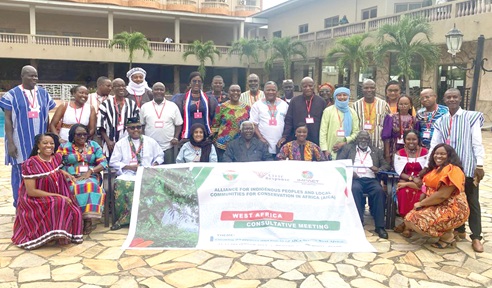
Indigenous peoples, communities need more recognition — Prof. Oteng-Yeboah
A renowned Ghanaian biodiversity expert, Professor Alfred Oteng-Yeboah, has called for greater recognition of Indigenous Peoples and Local Communities (IPLCs) in biodiversity conservation efforts and highlighting their historical stewardship of natural resources.
He said IPLCs had sustainably managed their environments for generations, maintaining biodiversity while securing food and livelihoods.
However, he noted that despite their participation in international conventions, the IPLCs often lacked the financial resources to implement conservation programmes.
Speaking at the Alliance for Indigenous Peoples and Local Communities for Conservation in Africa’s (AICA) first West Africa Regional Consultative Meeting in Accra last Wednesday, Prof. Oteng-Yeboah emphasised that IPLCs did not need lessons on conservation but rather adequate funding to support their initiatives.
The workshop, held from September 11-13, 2024, brought together delegates from 13 West African countries as well as other experts to review AICA's draft strategy and governance structure and align them with regional needs.
The programme was funded by the Tenure Facility and the Indigenous Movement for Peace and Conflict Transformation (IMPACT).
For Prof. Oteng-Yeboah, "The question of whether IPLCs need lessons in conservation is rhetorical," adding that "They (IPLCs) have the knowledge, but what they lack is access to sufficient funding."
The Chairman of the Steering Committee of the AICA, Mr Malidadi Langa, emphasised the importance of incorporating the perspectives of Indigenous Peoples (IPs) and Local Communities (LCs) in conservation discussions at local, national and international levels.
He noted that although IPs and LCs had long been the custodians of vast natural resources, their rights were often neglected and their voices excluded from conservation programmes.
He pointed out that despite playing a crucial role in protecting natural resources for generations, "these communities are frequently and unfairly labelled as destroyers of the environment."
The host of the consultative, who is also the Coordinator for Forest Watch, Mr Albert Katako, said the meeting was designed to allow the participants to develop an implementation plan for the AICA’s growth trajectory in the region including clear milestones and outcomes in the short-term, medium term, and the long term.
Similarly, he added, the workshop was intended to look at and discuss a whole range of issues relating to the institutional development of AICA, including proposals on legal entity status, secretariat location, rules of engagement with other organisations, partnership building, resource mobilisation and holding of AICA’s inaugural Annual General Assembly.
Resolutions
Key resolutions from the meeting included the formation of the West African Indigenous Peoples and Local Communities Network (WAIN/AICA-West Africa) and the creation of a committee to oversee governance.
Delegates affirmed that AICA's strategy aligned with the interests of IPs and LCs, and stressed the need for sustainable funding, stronger IPLC networks, and the inclusion of traditional knowledge in conservation practices.
They also stressed the need for formal recognition by governments and ECOWAS was also recommended to bolster the effectiveness of the network.
